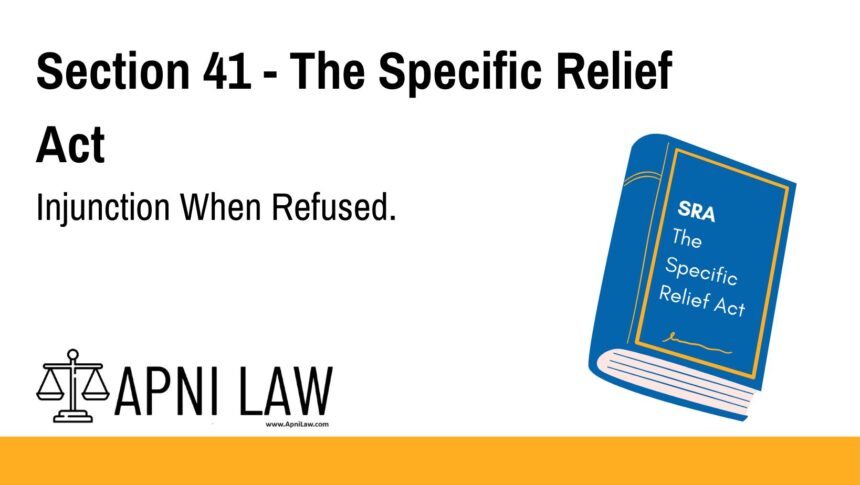Code: Section 41 – The Specific Relief Act, 1963
An injunction cannot be granted—
(a) to restrain any person from prosecuting a judicial proceeding pending at the institution of the suit in which the injunction is sought, unless such restraint is necessary to prevent a multiplicity of proceedings;
(b) to restrain any person from instituting or prosecuting any proceeding in a court not subordinate to that from which the injunction is sought;
(c) to restrain any person from applying to any legislative body;
(d) to restrain any person from instituting or prosecuting any proceeding in a criminal matter;
(e) to prevent the breach of a contract the performance of which would not be specifically enforced;
(f) to prevent, on the ground of nuisance, an act of which it is not reasonably clear that it will be a nuisance;
(g) to prevent a continuing breach in which the plaintiff has acquiesced;
(h) when equally efficacious relief can certainly be obtained by any other usual mode of proceeding except in the case of breach of trust;
(ha) if it would impede or delay the progress or completion of any infrastructure project or interfere with the continued provision of relevant facility related thereto or services being the subject matter of such project;
(i) when the conduct of the plaintiff or his agents has been such as to disentitle him to the assistance of the court;
(j) when the plaintiff has no personal interest in the matter.
Explanation of Section 41 – When Injunctions Are Not Granted
Section 41 of the Specific Relief Act lists the specific situations in which a court must refuse to grant an injunction. While injunctions are powerful legal tools to prevent harm or enforce rights, they are not allowed in every circumstance.
This section ensures that the use of injunctions is not abused. It outlines limits that protect public interest, judicial independence, and legal fairness. Courts avoid granting injunctions when:
- They interfere with ongoing or valid legal processes.
- They restrict a person’s right to approach the courts, legislatures, or law enforcement.
- The plaintiff’s own behavior undermines the fairness of their claim.
- The harm is too speculative or unclear.
- An alternative legal remedy is easily available.
It also addresses broader issues like the importance of infrastructure development, barring injunctions that might delay public projects.
Illustration
Example 1: Preventing Legal Proceedings in a Higher Court
A person tries to get an injunction from a lower court to stop someone from filing a case in a High Court. Section 41(b) prohibits this because the higher court is not subordinate.
Example 2: Public Infrastructure Projects
A contractor challenges the ongoing construction of a government highway project and seeks an injunction. If the court finds that the injunction would delay or disrupt the project, it must refuse relief under Section 41(ha).
Example 3: No Specific Performance in Contract
A buyer wants to stop a seller from transferring a property because of a broken oral agreement. But if the contract is not one that the law would specifically enforce, no injunction can be granted under Section 41(e).
Common Questions and Answers on Section 41 – Specific Relief Act
1. What is the main purpose of Section 41?
The section ensures that injunctions are granted only when truly necessary and not used to interfere with lawful proceedings, public interest, or rights of others.
2. Can I get an injunction to stop a criminal case?
No. Section 41(d) specifically bars courts from issuing injunctions in criminal matters.
3. What if someone is misusing the legal process—can I still seek an injunction?
Possibly, but only if the misuse leads to a multiplicity of proceedings and there’s a real risk of injustice. Even then, courts must be cautious, as most such requests are restricted under Section 41(a) and (b).
4. What does “plaintiff has acquiesced” mean in Section 41(g)?
It means the plaintiff knowingly allowed the violation to continue without protest. If they ignored the issue for too long, they can’t later ask the court to intervene.
5. Can an injunction be denied based on how the plaintiff acted?
Yes. If the plaintiff acted dishonestly, unfairly, or in bad faith, the court can deny relief under Section 41(i).
Conclusion
Section 41 of the Specific Relief Act sets important boundaries on when injunctions can be issued. It protects judicial independence, the rights of others, and ensures that injunctions are used fairly—not as tools of harassment or delay. Anyone seeking an injunction must ensure their claim doesn’t fall into any of the prohibited categories under this section.
For more well-explained legal content, visit ApniLaw.








